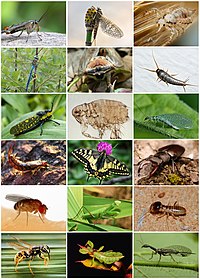
Photo from wikipedia
Natural behaviorally important stimuli are combinations of cues that are integrated by the nervous system to elicit behavior. Nonetheless, these cues dynamically change in time and space. In turn, the… Click to show full abstract
Natural behaviorally important stimuli are combinations of cues that are integrated by the nervous system to elicit behavior. Nonetheless, these cues dynamically change in time and space. In turn, the animal's internal state can cause changes in the encoding and representation of these stimuli. Despite abundant behavioral examples, links between the neural bases of sensory integration and the internal state-dependency of these responses remains an active study area. Recent studies in different insect models have provided new insights into how plasticity and the insect's internal state may influence odor representation. These studies show that complex stimuli are represented in unique percepts that are different from their sensory channels and that the representations may be modulated by physiological state.
Journal Title: Current opinion in insect science
Year Published: 2020
Link to full text (if available)
Share on Social Media: Sign Up to like & get
recommendations!